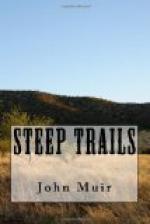Interest in hunting is almost universal, so deeply is it rooted as an inherited instinct ever ready to rise and make itself known. Fine scenery may not stir a fiber of mind or body, but how quick and how true is the excitement of the pursuit of game! Then up flames the slumbering volcano of ancient wildness, all that has been done by church and school through centuries of cultivation is for the moment destroyed, and the decent gentleman or devout saint becomes a howling, bloodthirsty, demented savage. It is not long since we all were cavemen and followed game for food as truly as wildcat or wolf, and the long repression of civilization seems to make the rebound to savage love of blood all the more violent. This frenzy, fortunately, does not last long in its most exaggerated form, and after a season of wildness refined gentlemen from cities are not more cruel than hunters and trappers who kill for a living.
Dwelling apart in the depths of the woods are the various kinds of mountaineers,—hunters, prospectors, and the like,—rare men, “queer characters,” and well worth knowing. Their cabins are located with reference to game and the ledges to be examined, and are constructed almost as simply as those of the wood rats made of sticks laid across each other without compass or square. But they afford good shelter from storms, and so are “square” with the need of their builders. These men as a class are singularly fine in manners, though their faces may be scarred and rough like the bark of trees. On entering their cabins you will promptly be placed on your good behavior, and, your wants being perceived with quick insight, complete hospitality will be offered for body and mind to the extent of the larder.
These men know the mountains far and near, and their thousand voices, like the leaves of a book. They can tell where the deer may be found at any time of year or day, and what they are doing; and so of all the other furred and feathered people they meet in their walks; and they can send a thought to its mark as well as a bullet. The aims of such people are not always the highest, yet how brave and manly and clean are their lives compared with too many in crowded towns mildewed and dwarfed in disease and crime! How fine a chance is here to begin life anew in the free fountains and skylands of Shasta, where it is so easy to live and to die! The future of the hunter is likely to be a good one; no abrupt change about it, only a passing from wilderness to wilderness, from one high place to another.
Now that the railroad has been built up the Sacramento, everybody with money may go to Mount Shasta, the weak as well as the strong, fine-grained, succulent people, whose legs have never ripened, as well as sinewy mountaineers seasoned long in the weather. This, surely, is not the best way of going to the mountains, yet it is better than staying below. Many still small voices will not be heard in the noisy rush and din, suggestive of going to the sky in a chariot of fire or a whirlwind, as one is shot to the Shasta mark in a booming palace-car cartridge; up the rocky canyon, skimming the foaming river, above the level reaches, above the dashing spray—fine exhilarating translation, yet a pity to go so fast in a blur, where so much might be seen and enjoyed.




